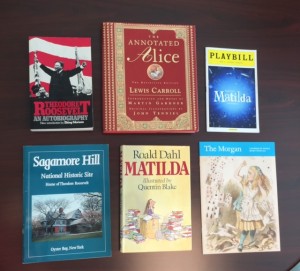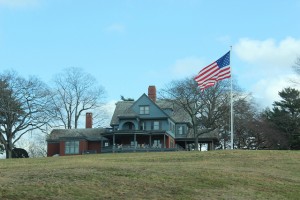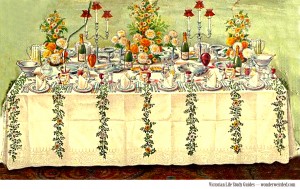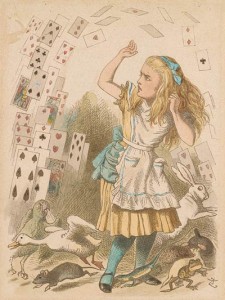 The Enduring Power of Books — As I was flying back to Charlotte last night, I reflected on my week in New York City. Over the course of the week, I focused much of my attention on researching Theodore Roosevelt’s personal library at his Long Island home, which is called Sagamore Hill. However, I also took advantage of some of the unique cultural opportunities available in the city. I went to the Morgan Library where I saw their exhibition titled “Alice: 150 Years of Wonderland.” I also saw Matilda: The Musical, which is based on Roald Dahl’s last children’s novel, also titled Matilda. In reflecting on these experiences, I realized that they all relate to the enduring power of books.
The Enduring Power of Books — As I was flying back to Charlotte last night, I reflected on my week in New York City. Over the course of the week, I focused much of my attention on researching Theodore Roosevelt’s personal library at his Long Island home, which is called Sagamore Hill. However, I also took advantage of some of the unique cultural opportunities available in the city. I went to the Morgan Library where I saw their exhibition titled “Alice: 150 Years of Wonderland.” I also saw Matilda: The Musical, which is based on Roald Dahl’s last children’s novel, also titled Matilda. In reflecting on these experiences, I realized that they all relate to the enduring power of books.
When viewed collectively, the books in Roosevelt’s personal library have the nearly magical power of making Roosevelt come alive. Roosevelt’s presence comes through clearly when one sees the 8,000 books that he collected and, in many cases, read. His books reflect his passions, his personality, and his personal history. Because these books are shelved in the same book cases that he and his family used so many decades ago, the arrangement of the books also speaks to his tastes and intellectual proclivities. One can see how he grouped books, how he favored certain books by giving them prime bookshelf space, and how he displayed his books with other objects that had meaning for him. Roosevelt was an avid reader, and his library captures this important side of his life.
One of the books that Roosevelt enjoyed and often quoted in his correspondence was Alice’s Adventures in Wonderland, so it seemed fitting that I was able to see the Alice exhibit during my week in New York. As I viewed the exhibit, I marveled at how many other people were also there to see the exhibit. During the two hours I spent at the Morgan Library, scores and scores of children and adults came to see the Alice exhibit, and they took their time examining the various items on display. The popularity of the exhibit underscored for me the power that certain books have among readers. Alice’s Adventures in Wonderland came out exactly 150 years ago, but it still has the power to captivate readers of all ages.
My wife and I saw Matilda on the last night of our visit to New York, and we both enjoyed it immensely. The musical is quite true to Roald Dahl’s story. As those of you who have read this story already know, Dahl’s tale is a celebration of books and reading. In the story, Matilda is a brilliant girl who loves to read, much to the chagrin of her crass and neglectful parents. Matilda turns to books to cope with her difficult life at home and school. Through her reading, Matilda finds the power to endure and eventually overcome the obstacles that face her. Of course, Roosevelt never read Matilda, but he too had a difficult childhood although for different reasons. He suffered from severe asthma as a child, and it was not until his teenage years that he had the stamina to engage in the strenuous physical activities that he so much enjoyed as an adult. Like Matilda, the young Roosevelt turned to books to help him overcome the limitations that constrained his childhood. His passion for reading can be traced back to his childhood, and throughout his life he continued to love the books that he had enjoyed as a boy.
There is a lot of power in books, I thought to myself as the plane reached cruising altitude. And then I pulled out a biography of Roosevelt and read until the plane touched down in Charlotte.
Kudos— As you know, I like to use my Monday Missives to share news about recent accomplishments by members of our department. Here is the latest news:
Boyd Davis, Jackie Guendouzi and Margaret Maclagan have just published “Expanding expectations for narrative styles in the context of dementia,” Topics in Communication Disorders 35: 237-257.
Allison Hutchcraft recently read her poetry as part of The Bridge Progressive Arts Initiative’s Reading Series in Charlottesville, Virginia.
Upcoming Events and Deadlines— Here are some dates to keep in mind:
August 3 — Last day of classes for the second summer session.
August 10 — Grades due for all classes taught during the second summer session.


